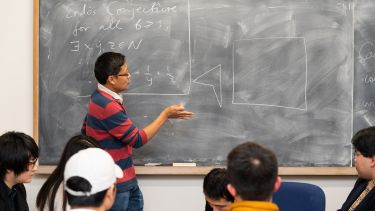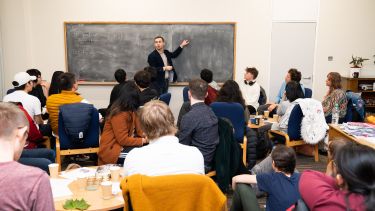Mathematics MSc
School of Mathematical and Physical Sciences ,
Faculty of Science
-
Start date
September 2025 -
Duration
1 year -
Attendance
Full-time
Explore this course:
Book now for our online postgraduate open day on Wednesday 30 April 2025.

Course description
Our Mathematics MSc gives you the freedom to choose from a variety of advanced lecture modules across pure and applied mathematics. From algebra, geometry and topology, to the ways that mathematics can be used in finance or studies of nature, our flexible one-year course is designed to help you build the foundations for a successful career.
Throughout our Mathematics MSc, you’ll have opportunities to improve your problem solving and presentation skills, and learn how to create persuasive and logical arguments. You'll develop your understanding of the areas you're most interested in through our individually tailored, directed reading module.
Our informal specialist lectures, which have smaller class sizes, allow you to have closer interactions with staff and students. You'll also be supported through regular meetings with your academic supervisor.
You'll gain valuable mathematics research experience by working with an experienced mathematician on a dissertation topic of your choice. Recent topics include:
- Goedel’s Incompleteness Theorem
- Geometry of groups, Amenability and the Banach-Tarski paradox
- Synchronised Chaos
- Analysis of stochastic differential equations
Modules
Core modules:
- Research Skills in Mathematics
-
The unit provides training in research-level skills used in mathematics and related technical disciplines, with a particular focus on mathematical/scientific writing and presentation skills. Students will gain experience in the use of appropriate computer packages for the presentation of mathematical and statistical material, and guidance on how to prepare a coherent, structured and accurate report. Topics covered include conducting literature searches, summarising information, accessing papers through preprint servers, and managing reference lists. Students will draw on these skills to write their own literature review in an area of interest to them, and prepare and deliver a talk on this topic.
15 credits - Dissertation
-
The dissertation is piece of extensive work (10-20,000 words) which provides students' with the opportunity to synthesise theoretical knowledge on a subject that is of interest to them. Students will gain experience of the phases of a relatively large piece of work: planning to a deadline; researching background information; problem specification; the carrying through of relevant analyses; and reporting, both at length through the dissertation and in summary through an oral presentation.
60 credits
Optional modules:
A student will take 105 credits from this group.
- Machine Learning
-
Machine learning lies at the interface between computer science and statistics. The aims of machine learning are to develop a set of tools for modelling and understanding complex data sets. It is an area developed recently in parallel between statistics and computer science. With the explosion of “Big Data”, statistical machine learning has become important in many fields, such as marketing, finance and business, as well as in science. The module focuses on the problem of training models to learn from training data to classify new examples of data.
15 credits - Special Topics
-
This module is available to students who have already covered the material in some of the courses offered on the MSc, and who would otherwise have difficulty in finding sufficient credits to complete the programme. A course of study would be proposed by a member of staff, which may consist, for example, of material from a book, or from a graduate lecture course taken by PhD students. The student would be expected to write a short report, as part of a portfolio of notes and exercises.
15 credits - Financial Mathematics
-
The discovery of the Capital Asset Pricing Model by William Sharpe in the 1960's and the Black-Scholes option pricing formula a decade later mark the beginning of a very fruitful interaction between mathematics and finance. The latter obtained new powerful analytical tools while the former saw its knowledge applied in new and surprising ways. (A key result used in the derivation of the Black-Scholes formula, Ito's Lemma, was first applied to guide missiles to their targets; hence the title 'rocket science' applied to financial mathematics). This course describes the mathematical ideas behind these developments together with their application in modern finance, and includes a project.
15 credits - Functional Analysis
-
Functional analysis is the study of infinite-dimensional vector spaces equipped with extra structure. Such spaces arise naturally as spaces of functions. As well as being a beautiful subject in its own right, functional analysis has numerous applications in other areas of both pure and applied mathematics, including Fourier analysis, study of the solutions of certain differential equations, stochastic processes, and in quantum physics. In this unit we focus on Banach spaces and especially Hilbert spaces - complete vector spaces equipped with an inner product - and linear maps between Hilbert spaces. Applications of the theory we examine include Fourier series and the Fourier transform, and differential equations.
15 credits - Further Topics in Mathematical Biology
-
This module focuses on the mathematical modelling of biological phenomena. The emphasis will be on deterministic models based on systems of differential equations. Examples will be drawn from a range of biological topics, which may include the spread of epidemics, predator-prey dynamics, cell biology, medicine, or any other biological phenomenon that requires a mathematical approach to understand. Central to the module will be the dynamic consequences of feedback interactions within biological systems. In cases where explicit solutions are not readily obtainable, techniques that give a qualitative picture of the model dynamics (including numerical simulation) will be used. If you did not take Scientific Computing at Level 2, you may still be able to enrol on this module, but you will need to obtain permission from the module leader first.
15 credits - Topics in Mathematical Physics
-
This unit will introduce students to advanced concepts and techniques in modern mathematical physics, in preparation for research-level activities.
15 credits
It is assumed that the student comes equipped with a working knowledge of analytical dynamics, and of non-relativistic quantum theory.
We will examine how key physical ideas are precisely formulated in the language of mathematics. For example, the idea that fundamental particles arise as excitations of relativistic quantum fields finds its mathematical realisation in Quantum Field Theory. In QFT, particles can be created from the vacuum, and destroyed, but certain other quantities such as charge, energy, and momentum are conserved (after averaging over quantum fluctuations).
We will examine links between conservation laws and invariants, and the underlying (discrete or continuous) symmetry groups of theories. We will also develop powerful calculation tools. For example, to find the rate of creation of new particles in a potential, one must evaluate the terms in a perturbative (Feynman-diagram) expansion.
For details of the current syllabus, please consult the module leader. - Special Topics 2
-
This module is available to students who have already covered the material in some of the courses offered on the MSc, and who would otherwise have difficulty in finding sufficient credits to complete the programme. A course of study would be proposed by a member of staff, which may consist, for example, of material from a book, or from a graduate lecture course taken by PhD students. The student would be expected to write a short report, as part of a portfolio of notes and exercises.
15 credits - Mathematical Modelling of Natural Systems
-
Mathematical modelling enables insight into a wide range of scientific problems. This module will provide a practical introduction to techniques for modelling natural systems. Students will learn how to construct, analyse and interpret mathematical models, using a combination of differential equations, scientific computing and mathematical reasoning. Students will learn the art of mathematical modelling: translating a scientific problem into a mathematical model, identifying and using appropriate mathematical tools to analyse the model, and finally relating the significance of the mathematical results back to the original problem. Study systems will be drawn from throughout the environmental and life sciences.
15 credits - Further Topics in Number Theory
-
Elementary number theory has been seen in a number of earlier modules. To go further, however, additional input is needed from other areas of pure mathematics - analysis and algebra. For example, the distribution of prime numbers is intricately related to the complex analytic properties of the Riemann zeta function And one can ask similar questions to those we ask about prime numbers for the rational numbers over, for example, quadratic fields. This module will treat examples of further topics in number theory, accessible with the aid of advanced mathematical background.
15 credits - Probability with Measure Theory
-
Probability is a relatively new part of mathematics, first studied rigorously in the early part of 20th century. This module introduces the modern basis for probability theory, coming from the idea of 'measuring' an object by attaching a non-negative number to it. This might refer to its length or volume, but also to the probability of an event happening. We therefore find a close connection between integration and probability theory, drawing upon real analysis. This rigorous theory allows us to study random objects with complex or surprising properties, which can expand our innate intuition for how probability behaves. The precise material covered in this module may vary according to the lecturer's interests.
15 credits - Directed Reading in Mathematics
-
This module consists of independent study in an area of interest to the student, and could serve as preparation for the MSc dissertation. Precise content and subject matter will depend on the interests of the student, as well as the level and background of the individual student. The module will be assessed with a portfolio consisting of a report and exercises set by the supervisor.
15 credits - Advanced Topics in Algebra A
-
Algebra is a very broad topic, relating many disparate areas of mathematics, from mathematical physics to abstract computer science. It was noticed that the same underlying structures arose in a number of different areas, and this led to the study of the abstract structures. This module studies some of the algebraic structures involved: fields, groups and Galois Theory; rings and commutative algebra, and gives applications to, for example, number theory, roots of polynomials and algebraic geometry.
30 credits - Advanced Topics in Waves and Fluid Dynamics A
-
Waves and Fluid Dynamics are cornerstones of Applied Mathematics. Both relate to the flow of fluids, i.e., propagation of information, which include not only gas (e.g., air) and liquid (e.g., water), but also in more complex media (e.g., lubricants and blood), and other materials or even the fourth state of matter: plasma. The scientific principles and mathematical techniques involved in studying these are of inherent interest. Wave motions give rise to well-known class of partial differential equations, and relate to concepts such as standing, progressive, and shock (i.e., nonlinear) waves; we can study these using Fourier series, Laplace transform and the powerful method of characteristics. Viscous fluid flow gives rise to the Navier-Stokes equations. The first semester will cover some of these ideas, while the second will move onto more advanced topics, such as three-dimensional flows, boundary layers, vortex dynamics, or magnetohydrodynamics.
30 credits - Algebraic Topology
-
This unit will cover algebraic topology, following on from metric spaces. Topology studies the shape of spaces, with examples such as spheres, the Möbius Band, the Klein bottle, the torus and other surfaces. The first task is to formalise the notion of space, and to work out when a given space can be continuously deformed into another, where stretching and bending is allowed, but cutting and glueing is not. Algebraic topology builds a powerful bridge between shapes and algebra, enabling the use of familiar algebraic techniques from linear algebra and group theory to study spaces and their deformations.
30 credits - Analytical Dynamics and Classical Field Theory
-
Newton formulated his famous laws of mechanics in the late 17th century. Later, mathematicians like Lagrange, Hamilton and Jacobi discovered that underlying Newton's work are wonderful mathematical structures. In the first semester we discuss this work, its influence on the subsequent formulation of field theory, and Noether's theorem relating symmetries and conservation laws. In the second semester, Einstein's theory of gravity, General Relativity, will be introduced, preceded by mathematical tools such as covariant derivatives and curvature tensors. Einstein's field equations, and two famous solutions, will be derived. Two classic experimental tests of General Relativity will be discussed.
30 credits - Stochastic Processes and Finance
-
Stochastic processes are models that reflect the wide variety of unpredictable ways in which reality behaves. In this course we study several examples of stochastic processes, and analyse the behaviour they exhibit. We apply this knowledge to mathematical finance, in particular to arbitrage free pricing and the Black-Scholes model.
30 credits
The content of our courses is reviewed annually to make sure it's up-to-date and relevant. Individual modules are occasionally updated or withdrawn. This is in response to discoveries through our world-leading research; funding changes; professional accreditation requirements; student or employer feedback; outcomes of reviews; and variations in staff or student numbers. In the event of any change we will inform students and take reasonable steps to minimise disruption.
Open days
Become part of our community of talented postgraduate taught students. Register now to join us at our online open day on Wednesday 30 April 2025.
Duration
1 year full-time
Teaching
You’ll be taught through a variety of lectures and small group seminars.
Assessment
Our assessment methods are designed to support the achievement of learning outcomes and develop your professional skills. This includes coursework, examinations and a dissertation.
Regular feedback is also provided, so you can understand your own development throughout the course.
Your career
Our Mathematics MSc graduates have the numerical, problem solving and data analysis skills that employers value in a variety of careers. This can help you stand out in the job markets where mathematics graduates thrive, such as computing, banking and data science. University of Sheffield mathematics graduates have been hired by employers such as Amazon, Barclays, Dell, Goldman Sachs, IBM, PwC, Sky, the NHS and the Civil Service.
You’ll cover advanced topics and gain extensive research training, which is also great preparation for a PhD. Sheffield mathematics graduates have secured postgraduate research positions at many of the world's top 100 universities.
School
School of Mathematical and Physical Sciences
The School of Mathematical and Physical Sciences is leading the way with groundbreaking research and innovative teaching.
Our mathematicians and statisticians have expertise across pure mathematics, applied mathematics, probability and statistics. We focus on a variety of topics, from the most abstract questions in algebraic geometry and number theory, to the calculations behind infectious disease, black holes and climate change.
In the Research Excellence Framework 2021, 96 per cent of our mathematical sciences research was rated in the highest two categories as world-leading or internationally excellent.
We have strong links with the Society for Industrial and Applied Mathematics, the Institute of Mathematics and its Applications, the European Physical Society, and the International Society on General Relativity and Gravitation. With the support of the London Mathematical Society, we are also an organiser of the Transpennine Topology Triangle, a key focal point for topology research in the UK.
Mathematics and statistics staff have received honours from the Royal Society, the Society for Mathematical Biology and the Royal Statistical Society, who also provide professional accreditation for our statistics courses.
Entry requirements
Minimum 2:1 undergraduate honours degree in Mathematics.
English language requirements
IELTS 6.5 (with 6 in each component) or University equivalent
If you have any questions about entry requirements, please contact the school/department.
Fees and funding
Alumni discount
Save up to £2,500 on your course fees
Are you a Sheffield graduate? You could save up to £2,500 on your postgraduate taught course fees, subject to eligibility.
Apply
You can apply now using our Postgraduate Online Application Form. It's a quick and easy process.
Contact
Any supervisors and research areas listed are indicative and may change before the start of the course.
Recognition of professional qualifications: from 1 January 2021, in order to have any UK professional qualifications recognised for work in an EU country across a number of regulated and other professions you need to apply to the host country for recognition. Read information from the UK government and the EU Regulated Professions Database.


